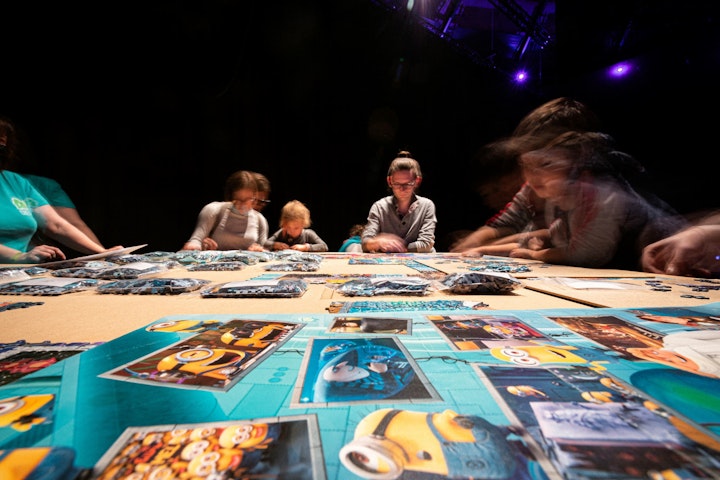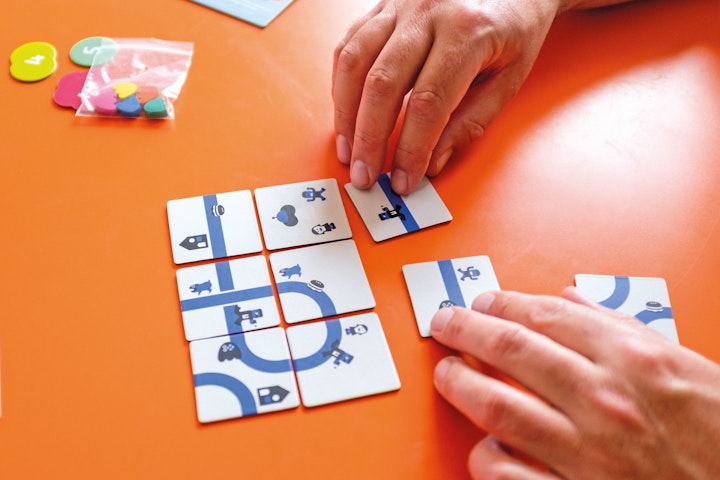
Interview Jean-Claude Pellin
Jean-Claude, have you always been passionate about board games? What is your background?
Jean-Claude Pellin: I studied to be an educator in Brussels and that’s where I first discovered game libraries where you can borrow both educational and family board games. There were a lot of specialised shops there too, many more than in Luxembourg. So, when I moved back here, I bought an old VW bus, named it Ludobus and, with the support of the SNJ, used it to show educators how to integrate games in an informal way as a learning tool. At the same time, I was lucky to meet members of a board game club called Spillfabrik. It’s a great place to meet up for those who are interested in board games, and it has been going now for over 10 years.
Do you think events like Game On are a good way to reach people who are not yet familiar with this type of game culture? How does it compare to café or pub game nights for example?
Both are quite different compared to a game night at home, where you play familiar games, with people you know and whose reactions you are used to. Playing is a social act: you learn a lot about your opponent, there’s an exchange. You don’t necessarily attend a games event in a competitive spirit, but rather to discover a large selection of (new) board games. People can sit at a table, have a game explained to them and, if they don’t like it, move on to the next activity. Because there is no obligation to play, even those who never get together in private to play a board game can venture to Game On.
It’s important for me to show the different facets of board games too. For example, we bring game illustrators and authors to the forefront, and by seeing their prototypes and work, it’s easier to understand the creative process there is behind a board game. Some visitors only come for the pub quiz; others are only interested in second-hand games. We also get a lot of families. Getting young people interested in board games remains a challenge, but there are ways of building bridges. At Game On we place video games on the same level as board games. Usually, even those who attend with a specific activity in mind end up getting to see everything else too.
(below: Game On 2021 © Mike Zenari)
What is it that prevents games from being taken seriously, from being considered as a cultural asset?
About 2,000 new games are released every year, including the adult segment. Sales of the big publishers tend to increase, and the global games market is set to continued growth. Initiatives such as the board game café that recently opened in Esch-sur-Alzette are multiplying. The municipalities are interested in hosting game-related events. I have always yearned to introduce people to the game culture, to demonstrate their value, to promote their right to a place alongside other art forms. That’s why organising Game On in a cultural institution like Rotondes was important to me because it helps strengthen the perception that games are a cultural asset. However, I think many people still have the impression that games are only for children.
Why should adults also play board games?
As soon as you get involved in a game, it’s like with a film or a book: you immerse yourself in another world where different rules apply, where you can be someone else and get away from everyday life. It’s important to let yourself have this moment where you’re detached from reality and can think differently. It can take some to learn, but once you allow yourself to do that, you relax.There are always people who don’t want to play board games because they don’t like it. So, there’s a challenge in finding a game they will enjoy. With so many different games and such variety, there is bound to be something for everyone. But the world of games isn’t as well understood as, say, the world of books. Someone who doesn’t read a lot will still have a pretty good idea of what you’re talking about if you mention a ‘crime book’ or a ‘biography’. But not many people know what you’re on about if you bring up a ‘worker placement game’ for example. And as long as that’s the case, I’ll see it as a public duty to keep on promoting games.
(below: © Gilles Kayser)
Games also have an educational role. During the Game On’s Educator’s Day various examples will be presented to teachers and educators. How important can game playing be for children?
I think that in every game, there’s at least one component that is also present in the school curriculum. Games can very conveniently be used in schools or in non-formal education, even if they don’t have a specific “educational” label. In fact, as a game developer, I’m not a fan of educational games. Children are smart, they quickly realise that there’s a hidden agenda in that type of game. This type of ‘forced learning’ doesn’t do anything positive for the ‘image’ of games. Parents should know that even a simple dice game can be part of a learning process.
The social factor is also important. In the past, a distinction was mistakenly made between board games and video games, stipulating that the latter lacked social interaction. Today, the world of video games is no longer demonised, it is even ahead of board games in terms of educational content. I don’t think you should only play cooperative games with children. It is important to learn to lose, but also to learn to win. By definition, a game has a clear beginning and a clear end. But when the game is over, the winner is not “better” and must learn not to be arrogant.
Learning to follow the rules is also essential. Of course, in this perspective it’s very different from free play, which is also extremely important for children’s development, especially in the early years. Non-formal education relies heavily on free play, which encourages creativity. Because children are curious, want to discover new things and experiment, board games can coexist very well with free play.
Do you have a favourite game?
I always associate games with the people I play with. It gives me great satisfaction to find out which board game suits a certain person and then have fun playing it together. The game maker in me always wants something to “happen” around the table. Not necessarily a verbal interaction, but I like to somehow influence the game and the decisions of the other players, otherwise I might as well be playing a solitary game – and I’m not interested in that. What matters is that your coplayers and you play the game, not the other way round.






